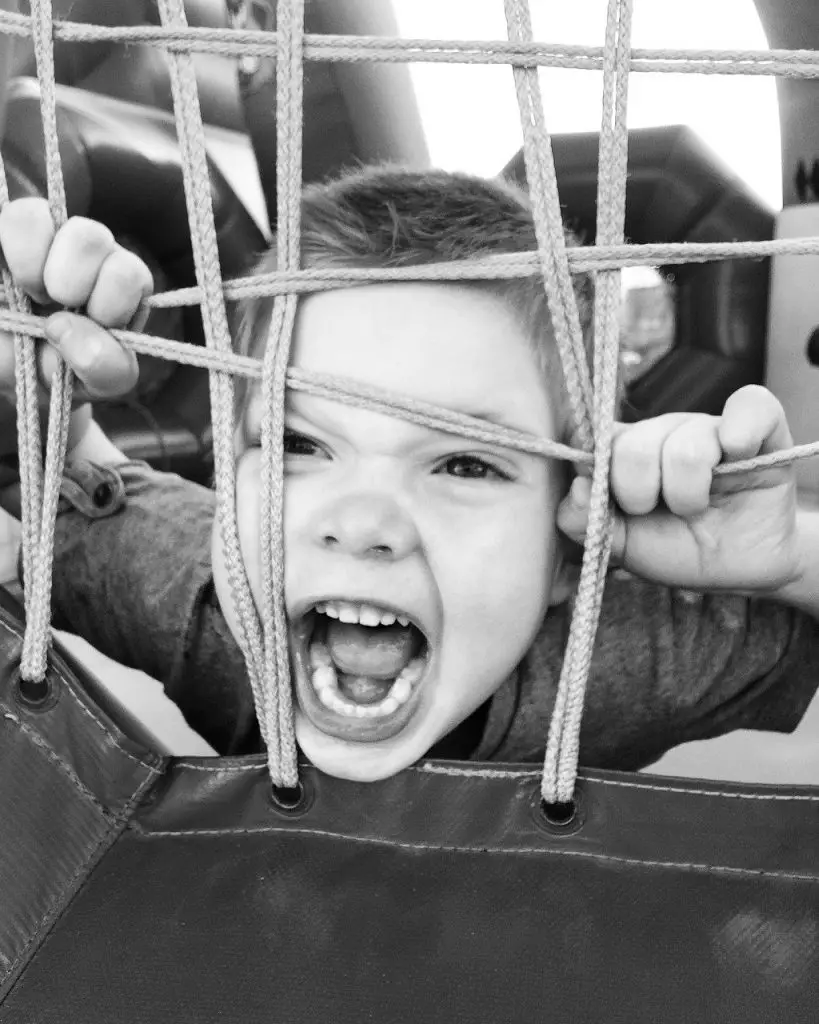It can become overwhelming and frustrating for a parent when your toddler’s behavior suddenly starts to get out of control.
It’s hard for many parents, both first-time and seasoned parents, to deal with arguments, outbursts, 3-year-old tantrums, and even daily calls from your toddler’s kindergarten.
However, you can make things better and improve the situation.
In this post, I am going to take a look at what you can do if your 3 year olds behavior is out of control. Raising a toddler can be easier…
What Causes 3-Year-Old Behavior to Be Out of Control?

There are numerous reasons why 3-year-old behavior is out of control. But given that bratty behavior comes in different forms, each behavior will have its underlying cause.
The following is a look at common bratty behavior and why the three-year-old could be doing it.
Hitting
For many children, hitting happens to be a common phrase that occurs as part of their development.
Traditionally, this behavior will start to manifest itself when the child is about two years old. But just because the behavior is common does not mean that parents should overlook it.
-

Bold Male Pride – Baseball Trucker Cap Celebrating Masculinity
£18.00 Select options This product has multiple variants. The options may be chosen on the product page -

Dad Bod Appreciation Gift Mug
£14.00 Add to cart -

Dad Bod, Bad Jokes Structured Baseball Cap
£22.00 Select options This product has multiple variants. The options may be chosen on the product page
Parents need to tackle the aggressive acts head-on and inform the toddlers that hitting is bad. While at it, try and teach your child how to govern their impulses. I know, easier said than done, right?
Whining
The main reason why a child will start whining is that he or she knows that it works. As a parent, when your kid starts to whine, it immediately starts to grate on your nerves.
You, therefore, find yourself giving in to the child’s demands without even giving it a second thought.
Deviant Behavior, Bedtimes, and Tantrums
Kids talk a lot but do not actually tell us much. As such, when they become frustrated, scared, or angry, they resort to shrieks, tears, and other maneuvers commonly associated with toddler meltdowns.
Preschoolers can also choose to behave in the same manner, especially when their parents are unwilling to give them what they really want. It’s common for tantrums to occur when a child is tired or hungry.
Resisting Bedtime
This is one of the simplest bratty behavior to explain: the reason is simple—the child would rather stay up with you or keep playing than go to bed.
Kids between the ages of two and three will frequently want to try and affirm their independence.
During this phase, the kids do not want to be asked to go to bed.
Acting Defiant
When your child reaches ages two and three, the former angel, who was quite easygoing, becomes handful, sassy, and stubborn.
The child will no longer follow or attempt to listen to your requests. Their favorite word slowly morphs into a firm “No!”
It’s not uncommon for you to start wondering what is happening to your child. The reality is that your child has slowly started to learn that they do, in fact, have a certain amount of control when it comes to their environment.
They will, therefore, try and do everything they can to gain some independence from their parents.
Ways to Combat A 3 Year Old Whose Behavior Is Out of Control

It’s not easy getting your three-year-old child to start behaving. But there is a trick to it: learning to pick your fights and practice consistency!
The following techniques can help with this:
Pick Your Battles
Choosing to battle your kid for every misdeed means that you will always be at war. Instead, what you need to do is come up with a list featuring the behaviors that bother you.
This list should contain the behaviors you consider annoying, uncivil, and dangerous. For those you consider forbidden, make sure to set specific and concise rules, including their logical consequences.
Make it a point to follow through on the discipline measures that you have decided.
If you lack consistency, the child is likely to become confused, and this will only act to enhance their rebellious streak.
Practice Prevention
As a parent, you already know everything there is to know about your child. You should use the knowledge you have on your child to prevent unnecessary blowups. For instance, if your kid likes to clean the kitchen cupboards in the morning when you’re preparing breakfast and don’t like it, purchase some new cabinet locks.
You will be surprised at how well childproofing works in reducing family blowups.
Stay Calm
If you are not able to prevent bratty behavior, then make sure to face it calmly.
The best approach will be to use a voice tone that is unruffled and quiet.
Apply words that are positive and neutral, and be sure to use suggestions to promote cooperation, as opposed to issuing commands.
Listen Carefully
Your child will normally feel better when they know that you are listening to what they are saying.
It will be crucial to try and repeat the concerns raised by your child frequently.
Repeating and addressing the concerns raised, especially when in public spaces may not satisfy their urges, but it does go a long way towards defusing conflict and reducing the kid’s anger.
Explain the Rules
It’s never obvious to a child why they should stop engaging in actions they consider fun, e.g., grabbing toys from other kids, hitting, and biting others. However, teaching them empathy may help them see that the actions they are engaging in are directly affecting other people.
In the process, you will be training your child to think about how their actions may affect others before they even engage in them.
Frequently Asked Questions

How do you discipline an out of control 3-year-old?
If you would like to take a harder stance with your kid, using a timeout is an efficient form of discipline. If the three-year-old has been throwing food, biting, or hitting, start by explaining why their actions are not acceptable.
You will need to take your child to a designated timeout area, e.g., the bottom stair or on a kitchen chair where your child will need to stay for one to two minutes until they are fully calm.
How do you know if your child has behavior problems?
A child with behavior problems will normally portray repeated and persistent patterns of defiance, anger, and backtalk. Additionally, they will also have experience some issues when it comes to managing and regulating their emotions. This may also include demonstrating aggressive behavior towards other kids.
While this is what you will typically notice in other kids, those with behavior problems will experience these issues more frequently and more intensely than others.
How do you discipline a child who will not listen?
You should not view discipline as a form of punishment. It’s recommended that parents approach disciplinary measures as a means of engaging with their children in order to assist them to frame their overall character.
When you choose to discipline your child, you will be teaching them the importance of restraint and self-control.
Conclusion
Having looked at what causes and possible solutions to when a 3-year-old behavior is out of control, it’s important to note that you can always ask for help.
Trusting your instincts is a good way to determine whether you require outside help to combat child behavioral problems.
When the child’s behavior starts to become overwhelming, the best thing you can do for both of you is to ask for assistance.
And remember, asking for help is not an indication that you are doing something wrong.
Good luck!


